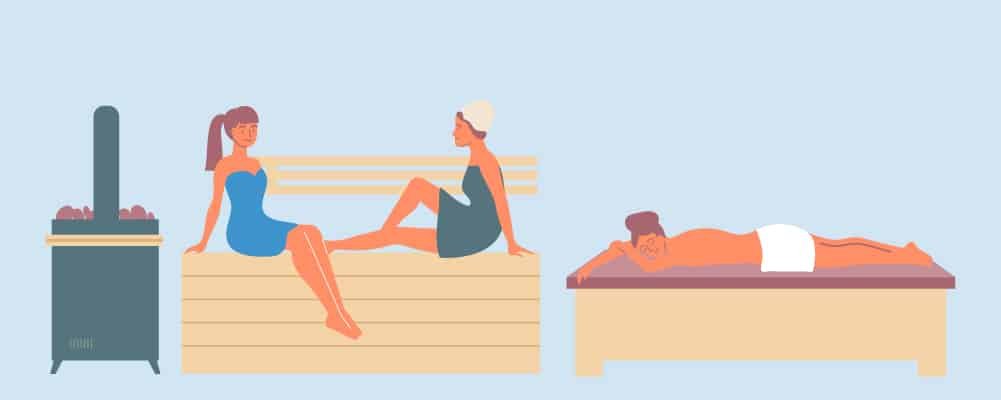
For centuries, people have used saunas and heat therapy to entertain the masses and ensure healing and wellness. It has also become a core process that many people have incorporated into their routine, especially as part of a post-exercise regime.
With some saunas heated up to 195 degrees Fahrenheit, these typically wooden rooms are great for taking time and relaxing in dry heat.

Nowadays, attending 15 to 20-minute-long sauna sessions a couple of times a week is a global practice that continues to grow in popularity each year, with more individuals looking to incorporate a sauna visit into their lifestyle now more than ever before.
Aside from simply feeling good, a sauna benefits your mood, body, and skin. Establishing a solid and frequent sauna routine could do wonders for your mental and physical health.
Alongside a balanced diet and a thought-out exercise program, all of the heat generated by a sauna can stimulate areas of the body to improve your general wellness.
But what are the main benefits of using a sauna? And is it truly worth incorporating into your current lifestyle?
If you want to know more about the practice and how it could help you to improve your general health and well-being, this article will highlight everything you need to know before beginning your sauna journey.
Helps Preserve Muscle Mass
Preserving and maintaining muscle mass is important as your muscles work to keep your metabolic system ticking over. By preserving your muscle mass, you are protecting yourself against diabetes, obesity, and different cardiovascular diseases while also ensuring that your hormone levels and metabolism remain functioning at high levels.
If lifting weights and partaking in strength training exercises is something you are interested in, you are likely familiar with growth hormone (GH). This is essential for muscle growth and eventual repair and is also often a crucial part of fat loss.
While a good night’s sleep and strength training are great ways to naturally increase your GH levels, saunas tend to take it to the next level. These small rooms have extreme temperatures between 150°F and 195°F (65°C and 90°C), which will elevate GH production by subjecting your body to increased rates of heat-induced stress, leading to an improvement in muscle growth and recovery time.
This is due to a release of heat shock proteins and HGH. Heat shock proteins have many benefits for preserving muscle mass, including improving blood flow and overall blood volume, faster muscle recovery and repair rate, and higher rate of insulin production.
As a result, high-temperature saunas are great at transporting necessary nutrients to your muscles while also improving muscle recovery from more intense workouts, leading to the preservation of muscle mass.
Boosts Heart Health
Relaxing in a sauna can be an enjoyable experience, despite your body not being used to the exposure to such high heat. However, one of the most important things to mention is the link that saunas have with heart health.
While spending some time in a sauna doesn’t have the same impact on your heart as a workout, using a sauna can still significantly reduce stress levels and improve cardiovascular health at the same time by building up your endurance.
Infrared or traditional saunas have intense high temperatures that heat the skin and increase your core body temperature. In response to sitting inside a sauna, your heart rate may increase anywhere from 100 to 150 beats per minute.
The blood vessels located near the skin will also dilate while you are inside a sauna, causing an increase in cardiovascular circulation with an oxygen-rich blood flow.
This specific process of increased circulation is comparable to partaking in low to moderate cardio exercises depending on the duration of your sauna usage.
This produces white blood cells that reduce inflammation and reduce swelling which works to alleviate types of chronic pain. Infrared saunas also guard against inflammation.
As a result, regular sauna usage can lower blood pressure, enhance heart function, and generally work well as a tool to keep your heart healthy.
Improves Skin Strength
Using a sauna might be the next step in your skincare routine if you’re looking for an all-natural way to improve skin strength. Heated bathing remains one of the most prominent treatments to cleanse the skin and is still widely used around the world today.
Though some specific benefits of using a sauna depend entirely on your skin type (sensitive, normal, or dry, for example), there are some prominent universal benefits of using a sauna to improve skin strength.
- Stimulates collagen – the heat from using a sauna enhances the production of collagen, which strengthens and rejuvenates your skin. This makes the process of removing dead skin cells and promoting the growth of healthier ones in turn much easier.
- Keeps skin young – like any other organ, your skin has its system of operation. Regular usage of a sauna will create an efficient skin that functions and breathes even as you age, ensuring that your skin remains young.
- A natural and healthy glow – the temperature of a sauna will also typically lead to a dramatic rise in blood circulation, giving your skin a healthy glow and a fresher appearance without the need for makeup.
- Moisturizes the skin – Saunas – especially infrared saunas – are excellent chemical-free ways to moisturize the skin from the innermost layer to the outer layer. This increased moisture will work to reduce the appearance of wrinkles.
Clears Your Pores
Having blocked pores is a huge contributor to acne and could cause boils, blackheads, and whiteheads. If acne or clogged pores are something you struggle with daily, taking a trip to the sauna might be exactly what you need!
Exposure to a sauna’s high heat for long periods will also make you sweat, which removes bacteria and other impurities from the sweat ducts and the epidermal layer. It also stimulates the sebaceous glands found in the skin that keep everything in the skin lubricated and moisturized.
Thorough cleansing of pores in the skin using the heat from a sauna has the potential to improve capillary circulation while also ensuring that your skin looks and feels softer.
However, if you suffer from skin conditions like psoriasis or eczema, you might find that using a public sauna only serves to aggravate areas of your skin that are more prone or sensitive to such conditions.
This is because these environments have the potential to be quite humid, which could make them a breeding ground for mold and bacteria, causing skin conditions to appear or worsen. If this is something you are worried about, the best thing you can do is seek professional advice from a dermatologist or your doctor to find out more information.
Reducing Stress Levels

It’s in our nature to experience stress daily. Stress can often feel like it prohibits you from getting on with your life but it’s all about how
Sitting in a sauna forces you to relax, decompress, and embrace the moment. As you clear your mind and unwind in the heat, your muscles will begin to relax, stimulating the release of endorphins – or “feel-good” hormones – that will alleviate a lot of the stress you might be facing in your day-to-day life.
Specifically, sauna heat works to regulate the cortisol levels in our blood. Cortisol is the hormone that is released whenever we feel stressed or anxious. Extreme levels of this hormone could result in issues with sleeping and with your immune system so you should put all your focus into learning to control these levels.
If you’re stressed your heart likely feels like it is beating straight out of your chest. A common culprit of stress is high blood pressure but a sauna works to reduce the risk by increasing your body’s circulation. This helps your heart and reduces blood pressure.
By consistently sitting in a sauna, you will actively work to remove toxins from your body, increase your resistance to stress, and also decrease your general anxiety.
Eases Pain
If you struggle with a condition such as fibromyalgia or are a frequent gym-goer, you’ve probably developed your own methods of managing or staying on top of any muscular pain that arises. This may include drawing yourself a hot bath packed with lots of Epsom salts or applying a heat pack directly to the point of pain.
Yet if these methods aren’t effective enough to work for your specific needs, there is a better way to help your body heal sore muscles and accelerate the rate of recovery – arguably the most comfortable and relaxing way to do so.
Saunas, especially infrared saunas, work to soothe aches and pains in your joints and muscles by helping blood vessels to relax and dilate, improving the elasticity of muscle tendons, helping blood flow to increase, and generally relieving any tension around your body.
This will leave you and your body feeling energized!
As mentioned above, the body will also release endorphins while in a sauna which might help to distract from the overall rate of pain felt.
Saunas are especially great for easing pain in individuals with rheumatoid arthritis, lower back pain, and chronic pain. Using a sauna isn’t a miracle cure but it might be worth trying it out to see if it reduces symptoms!
Helps Asthma

There isn’t a lot of recent research into the effectiveness of using a sauna for asthma, but it is generally quite safe for individuals with the condition.
The extreme heat of a sauna might help improve breathing and respiratory functions by opening your airways, reducing stress, and loosening phlegm so that breathing remains as easy as possible.
If you have asthma, you might benefit greatly from regular sauna use!
Bathing in a sauna has also been said to enhance lung function and capacity, which is great news for individuals who suffer from asthma or bronchitis. This is thanks to the vapors and dry heat that are typically supplied by a sauna that aim to open and eventually cleanse the lungs, loosening excess mucus and toxins from the sinuses and throat.
Whether or not a sauna is appropriate for you depends on your asthma triggers. If your asthma is triggered by heat and high humidity, it would be best to avoid these small heated rooms.
If you want to try it out, you will need to limit the time you spend inside of a sauna to see how your body and your asthma react to your environment. Most importantly of all, keep your inhaler on hand!
Saunas Aid In Recovery After Exercise
If you’re a frequent visitor of gyms or health clubs, then you’re probably familiar with the idea of such places having a sauna within the building. There are many types of saunas out there, but all of them provide a relaxing end to any exercise routine.
Saunas provide very effective immersive heat therapy. A sauna’s dry heat can cause the skin’s temperature to reach up to 104 degrees Fahrenheit within only a few minutes. This almost fever-like effect might help to relieve muscle pain caused by exercise.
The heat effects of using a sauna will also be very helpful in removing lactic acid from your muscles, helping you to recover much faster after exercise. Using a sauna in this way also reduces inflammation and relaxes muscle contraction.
This makes saunas an extremely effective and favored method of combatting muscle issues after completing a period of exercise.
Aside from physical recovery, saunas also greatly increase mental recovery after exercising. For instance, sauna use allows for mental clarity and relaxation while also increasing levels of positivity, allowing the user to decompress from their day.
Saunas Flush Toxins
When your body temperature is raised, your skin will blush, and your heart will beat faster, which moves the blood much closer to the skin’s surface. A process commonly referred to as lipolysis will begin breaking down many fat tissues within the body. These contain toxins that are released directly into the bloodstream.
As you sit in the high heat of a sauna, your core body temperature will rise significantly. As a result of this, and as a way of trying to regulate your temperature, you will begin to excrete a large amount of perspiration (sweat) through the skin while inside the sauna. Many other toxins are sent to the liver and the kidneys.
Through increased sweating, sauna therapy is useful for pushing out toxins through urine and human waste. While being in a sauna cannot completely detoxify the body, it actively facilitates the removal of toxins via the largest organ in the body, the skin.
Sweat has the purpose of cooling down the body and is composed nearly entirely of water. More important, however, is the fact that sweating inside of a sauna has proven to be very helpful in reducing the chemicals and levels of toxins such as nickel, copper, mercury, zinc, and lead in the body. These heavy metals can be found in many environments and are easily absorbed.
One thing to point out is that some people might feel worse after the sauna, but this is usually only temporary as this sudden release of toxins can make you feel worse in the short term.
You will find more success in flushing unwanted toxins from the body via high-penetrating heat that is used regularly.
Improve Brain Health

As we’ve touched on previously, saunas have a variety of amazing physical and mental benefits. It might seem like a stretch to say that saunas improve brain health, but there is evidence to back this claim up!
To begin with, infrared saunas improve blood circulation throughout the body. An increased blood flow to the brain helps to boost mental alertness and is a critical factor in ensuring peak task performance.
These saunas have also had proven mental health benefits. They optimize the natural antidepressants that are found in our brain — serotonin, norepinephrine, and dopamine — in terms of their production and reception. These also work to actively lower the level of cortisol that can be found in the body.
An observational Finnish study goes on to suggest the positive effects of regular visits to the sauna on the lower overall risk of developing Alzheimer’s disease and dementia.
During this study, the men who used a sauna between four and seven times a week were found to be 66 percent less likely to be officially diagnosed with dementia and 65 percent less likely to be diagnosed with Alzheimer’s than other participants only visiting the sauna once a week.
Though no conclusive evidence shows a direct correlation between using a sauna and improving brain health, some benefits must be accounted for.
Saunas Induce A Deeper Sleep

We live hectic lives that can oftentimes make having a full night of rest an impossibility. Many people struggle to fall asleep and will try a variety of methods to nurse themselves into an unconscious state, such as cutting out caffeine and spraying lavender on their bedding to relax the mind.
One of the more unexpected benefits of using a sauna is that it can induce a deeper sleep. If sleep eludes you at night, you might benefit greatly from a late-night heated sauna bathing session.
Raising your body temperature just before you head off to bed will push your body to readjust its temperature. This process of cooling down your body temperature after the sauna bath has the potential to keep you feeling calm and relaxed to get a good night’s sleep.
Plus, a sauna pushes your body to work hard and maintain homeostasis in an extremely hot environment. This additional exertion and effort should make you feel more tired in general and might be the catalyst for dropping off quickly.
If getting a good night’s sleep seems like a dream to you, you’ll likely benefit from using a sauna!
Saunas May Be Good For People Undergoing Cancer Treatments
Aside from providing a relaxing environment for an individual undergoing cancer treatment, a sauna could also be used as a holistic health treatment. However, it could also be used as part of a hyperthermia therapy regime (also known as thermal therapy) which is where cancer cells are exposed to extremely high temperatures in the hopes of killing them.
Cancer cells are much more sensitive and intolerant to higher temperatures than normal cells are. Simply put, cancer cells can be killed off by high heat while normal cells cannot. Thankfully, using hyperthermia (thermal therapy) does not cause any damage to the healthy cells and tissue that remain in the body.
Some previous research has suggested that using such therapy will significantly reduce the size of tumors within the body when hyperthermia is used in conjunction with other cancer treatments.
The ability infrared saunas have to boost circulation helps bring essential nutrients and oxygen to the body’s cells. As cancer often grows in the tissues of the body that have poor circulation (and low levels of nutrition and oxygen), taking the time to improve circulation might be a contributing factor in the reversal of the cancer process.
Overall, therapies like using an infrared sauna that directly inhibit the sympathetic nervous system are great in helping to ensure cancer recovery.
Recreational And Social Benefits
Saunas cannot be simplified to merely being a recreational activity that passes the time. This is because using a sauna provides a variety of important health benefits that could positively impact your life.
Yet, aside from providing you with many physical and mental health benefits, using a sauna is also a great activity for social reasons.
While the sauna is a great place for solitude and private relaxation, it is also an excellent way to relax in a social environment with family and friends.
Strangely enough, such social benefits are rarely discussed when it comes to using a sauna. However, this does not lessen their importance!
This is largely because you cannot take a mobile phone into a sauna which automatically removes the massive influence that technology has on our daily lives. By entering a sauna with someone you know, you automatically guarantee a great way to connect on a deeper level without any of the usual distractions.
You can converse and connect with other people in the room or enjoy your time in the sauna in complete quiet. That’s great about using a sauna — you can base your experience entirely on your terms.
Increases Weight Loss

If you find yourself inside a sauna, you’ll likely be able to feel your heart rate increase. Don’t panic – this is completely normal! Just think: you aren’t used to being exposed to such high heat, so it’s bound to send your body into a bit of a tailspin.
A moderately conditioned individual could sweat off around 500 grams in one sauna session while consuming almost 300 calories during the process due to an increased heart rate.
As your heart activity increases and your body demands lots more oxygen, you will find that your body begins to convert a lot more available calories into usable energy to keep you alert and aware while in the sauna, where you will expel a lot of toxins via sweat.
This is incredibly useful as sweating and attempting to regulate your temperature during your time in a sauna requires the use of a lot of this energy.
Other current research suggests that you can burn nearly as many calories from staying in a sauna as you might burn from going on a run. However, while using a sauna cannot be directly linked to weight loss, it does help to burn calories and ensure a sped-up metabolic rate.
Helps Immune Function

Did you know that using a sauna can greatly benefit your immune system function? If not, then you know now!
As you are exposed to the heat of a sauna, your body will produce white blood cells much faster than usual, which will work to kill viruses and fight any illnesses in your body.
Using a sauna to create an artificially induced fever might also clear your sinuses if you have allergies or a cold. This is usually associated with the fact that the microbes causing the specific ailment cannot withstand the intense heat and are instead prone to dying off at a higher temperature.
To summarise, saunas are a quick way to open up your airways and make it much easier for you to breathe, which can be especially helpful if you are struggling with symptoms of congestion. They also increase oxygenation and blood flow, two factors that carry immunity boosters throughout your entire body.
Generally, saunas are great for strengthening your immune system as long as you use them correctly and regularly. This includes alternating between hot and cold (stepping in and out of the sauna in bursts) which helps you train your body to better adapt to sudden temperature changes, which will prevent you from becoming cold so quickly.
Lengthening Lifespan
Sauna usage has the potential to lower inflammation and provide lots of benefits for heart health. Yet it can also lead to an increased rate of longevity by reducing the risk of heart disease and all-cause mortality.
Many people theorize that it is the heat activation of the FOXO3 (the “longevity gene”) that can be attributed to effective sauna usage. The variants of this gene have been linked to a lower risk of heart disease, cancer, and age-related disease.
While there isn’t much evidence to support this, the heat stress caused by a sauna will activate heat shock proteins. These will go on to make our cells much more resistant to stress and damage in addition to making them more robust.
Frequently using a sauna has links to a reduced risk of cardiovascular issues such as heart failure and coronary heart disease. Ultimately, this leads to a longer life.
For anyone looking to get moving but lacking the physical ability to go out of their way to exercise, adding in a couple of sessions using the sauna per week is a great way of reducing major health risks and lengthening your lifespan.
However, though a sauna has the power to contribute to your longevity and general health, it cannot guarantee a longer lifespan. It will only help you along the way.
Summary

As this article has highlighted, there are many benefits associated with using a sauna. Some of these benefits might appear to be more life-changing than others but they all have their importance in terms of preserving or improving your physical health.
Whether you’re looking to improve your immune function, increase circulation around your whole body, or get a better night’s sleep, for example, using a sauna regularly could provide a whole host of amazing health benefits that could have an immensely positive impact on your life.
A sauna is most definitely worth incorporating into your current lifestyle if you have the time, energy, and funds to do so. Aside from the incredible health benefits, it could give you, entering a sauna is also a great way to socialize with other people — whether you intend to meet up with friends or family or talk with strangers.
Saunas can also be a private practice if that is something you are interested in or generally prefer. You have complete control over how you experience your time in a sauna.
As great as saunas can be, you must also remember that if you feel unwell, develop a headache, or experience dizziness while in a sauna, you must immediately leave and begin to cool yourself down. Take some time to then rehydrate yourself and recover.


